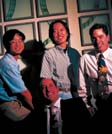 Five UC Davis researchers receive seed grants Five cancer researchers at UC Davis have received Institutional Research Grants from the American Cancer Society this year. The grant program is designed to encourage younger faculty to study the causes and cures of cancer and to develop new projects that will become likely candidates for national funding. The awards, totaling $84,500, were presented at a reception in June. Richard Bold, an assistant professor of surgery, received an award to study genes that regulate cell death in pancreatic cancer. Pancreatic cancer has one of the lowest survival rates of any cancer - fewer than five percent of patients live five years past diagnosis. Radiation and chemotherapy are only marginally effective against it. Bold wants to study transcription errors in the tumor suppressor genes bcl-2 and bak, which may be responsible for allowing pancreatic cancer cells to escape programmed cell death (apoptosis). Sui Shen, an assistant professor in hematology/oncology, got support for a project using a high-tech imaging system to track radiation as it travels through the body after being administered in a monoclonal antibody, a molecule engineered to attach to cancer cells. Shen will use single photon emission computer tomography (SPECT) scanning to monitor the emission of radionuclides used to treat advanced breast, prostate, and ovarian cancers and lymphoma. Kazuhiro Shiozaki, an assistant professor of microbiology, received funding to study a stress-signaling pathway of a kinase that determines how cells respond to environmental changes. By studying the pathway in yeast, researchers hope to learn more about how cancer cells respond or don't respond to radiation and chemotherapy. John Voss, an assistant professor of biological chemistry, received funding to study how an enzyme called the sodium-proton exchanger is activated or inactivated. Brain cancer cells called astrocytomas rely on over-expression of the sodium proton exchanger to thrive in an oxygen-deprived environment. Without a func- tional sodium-proton exchanger, the tumor cells acidify and die. Working with Peter Cala, Voss hopes to shed more light on how inhibiting this process might be used to develop new drugs to treat brain cancer. Patty Wong-Yim, an assistant research pharmacologist/toxicologist, received an award to study how a family of man-made chem- icals called polychlorinated biphenyls (PCBs) may promote non-Hodgkin's lymphoma. A recent epidemiological study found a connection between non-Hodgkin's lymphoma and people who have both high serum levels of PCBs and exposure to the Epstein-Barr virus. Wong-Kim will study the underlying mechanism by which PCBs may stimulate T cells to become cancerous.
Home |
Table of Contents |
To our Readers |
Building on Basics UC Davis Health System | © 2000, 2001, 2002 UC Regents. All rights reserved. |
 |
